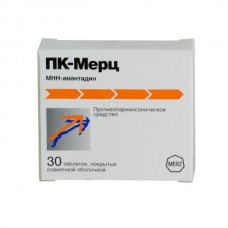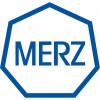Expiration date: 02/2026
The composition and form of issue:
Tablets, film-coated. 1 tablet contains:
the amantadine sulphate 100 mg
in a contour cells packing 10 PCs., in a cardboard 3 bundle packaging.
Solution for infusion 500 ml contains:
amantadine sulfate 200 mg
in bottles, PE, 500 ml in box of 2 or 10 bottles.
Description pharmacological action:
Increases release of dopamine from neuronal depot and it inhibits reverse neuronal uptake, stimulates dopaminergic transmission. Inhibits the generation of impulses in the motor neurons of the Central nervous system.
Dosage:
INSTRUCTIONS for use of PK-Merz tablets with film coating
Approved by Pharmacological State Committee of Ministry of health of Russia 18 February 1999 St. ?2B
Composition
1 tablet, film-coated, contains sulfate 1 - adamantanamine (sulfate amantadine) 100 mg.
Pharmacological properties
The drug stimulates the release of dopamine from neuronal depot and increases sensitivity of dopaminergic receptors to mediator (dopamine). Thus, even when reducing the formation of dopamine in the basal ganglia, the conditions for the normalization of ongoing physiological processes. Inhibits the generation of impulses in the motor neurons of the Central nervous system.
Testimony
Used in Parkinson's disease and parkinsonism of different etiology. The drug is effective in respect of the triad of symptoms observed in Parkinson's disease (mainly with rigid and akinetic forms less effect on the hyperkinetic syndrome — tremor).
Residual symptoms and pain after stereotactic operations.
Contraindications
- Hypersensitivity to the drug.
- Glaucoma.
- Adenoma of the prostate gland.
- Psychomotor agitation.
- State of preddeliria and delirium, a history of psychosis.
- Epilepsy.
- Hyperthyroidism.
- Acute and chronic diseases of the liver and kidneys.
- Pregnancy (I trimester)
- Breast-feeding.
Side effects
Mental disorder, accompanied by visual hallucinations. Rare — motor or mental excitement. Urinary retention in patients with prostate cancer. Heart failure. Arrhythmia, tachycardia, nausea, dry mouth, dizziness, sleep disorder. Very rare — the appearance of a bluish coloration of the skin of the upper and lower extremities, decreased visual acuity.
Interaction
Simultaneous reception of diuretics, which is a combination triamterene/hydrochlorothiazide may cause changes in the concentration of amantadine in plasma. In combination therapy with other drugs against Parkinson's disease you may need to alter the doses of other drugs or the combination as a whole, otherwise it can increase side effects (e.g., exogenous psychosis).
Method of application and doses
Dosing regimen is individual. The drug is administered after a meal. Usually the treatment begins in the first 3 days — 1 tab. a day. Then increase this dosage to 2 table. a day, and it is possible to further increase the dose to 1 tab. a week. In the case of the combined treatment of parkinsonism it is necessary to determine the dose individually. The last dose should be taken at the afternoon before dinner.
In elderly patients, including patients suffering from a state of excitement and confusion, preddeliria and delirium, require a lower dosage.
Special instructions
Treatment of PK-Merz should not be discontinued abruptly, as this may lead to worsening symptoms. Patients with heart failure or circulatory disorders should be under constant medical supervision when administering the drug PK-Merz.
The drug can lower the concentration of attention and speed of response, therefore, when using the car and other mechanisms should be cautious. On the background of treatment contraindicated use of alcohol.
Release form
Tablets, film-coated, in a contour acheikova packing 10 PCs., in a cardboard 3 bundle packaging.
Storage conditions
PK-Merz should not use after the expiry date. Keep out of reach of children. Keep at temperature not exceeding 25°C.
The manufacturer
"Merz Pharma GmbH and Co. KGaA" 60318, Germany, Frankfurt am main
INSTRUCTIONS for use of PK-Merz intravenous solution
Approved by Pharmacological State Committee of Ministry of health of Russia 18 February 1999 St. ?2B
Composition
500 ml of solution contain sulfate 1-adamantanamine (amantadine sulfate) 0.2 g.
Pharmacological properties
The drug stimulates the release of dopamine from neuronal depot and increases sensitivity of dopaminergic receptors to mediator (dopamine). Thus, even when reducing the formation of dopamine in the basal ganglia, the conditions for the normalization of ongoing physiological processes. Inhibits the generation of impulses in the motor neurons of the Central nervous system.
Testimony
- Intensive primary treatment of severe and life-threatening cases of parkinsonism (including akinetic crises).
- Temporary interruption of oral therapy.
- Loss of consciousness due to traumatic brain injury.
- Slower recovery from anesthesia.
- Neuralgia in shingles.
Contraindications
- Hypersensitivity to the drug.
- Glaucoma.
- Adenoma of the prostate gland.
- Psychomotor agitation.
- State of preddeliria and delirium, a history of psychosis.
- Epilepsy.
- Hyperthyroidism.
- Acute and chronic diseases of the liver and kidneys.
- Pregnancy (I trimester)
- Breast-feeding.
Side effects
Mental disorders, soprovojdayuschiisya visual hallucinations. Rare — motor or mental excitement. Urinary retention in patients with prostate cancer. Heart failure. Arrhythmia, tachycardia, nausea, dry mouth, dizziness, sleep disorder. Very rare — the appearance of a bluish coloration of the skin of the upper and lower extremities, decreased visual acuity.
Interaction
Simultaneous reception of diuretics, which is a combination triamterene/hydrochlorothiazide may cause changes in the concentration of amantadine in plasma. In combination therapy with other drugs against Parkinson's disease you may need to alter the doses of other drugs or the combination as a whole, otherwise it can increase side effects (e.g., exogenous psychosis).
Method of application and doses
The dosage should exercise for each patient individually.
Appoint 1-2 times a day 500 ml dose can be increased to 3 times a day, 500 ml Duration of infusion 3 h/in (55 drops/min).
With reduced renal function, we suggest the following dosage:
| Glomerular filtration rate (GFR), ml/min | Dosage, mg | The dosage interval (h) |
| 80-60 | 100 | 12 |
| 60-50 | 200 and 100 alternately | Every second day |
| 50-40 | 100 | 24 |
| 30-20 | 200 | 2 times a week |
| 20-10 | 100 | 3 times a week |
| <10 | 200 and 100 alternately | Weekly and every other week |
In severe cases (for example, when akinetic crisis), the dose may be increased based on an assessment of risk.
Special instructions
Treatment of PK-Merz should not be discontinued abruptly, as this may lead to worsening symptoms. Patients with heart failure or circulatory disorders should be under constant medical supervision when administering the drug PK-Merz.
In elderly patients, including patients suffering from a state of excitement and confusion, preddeliria and delirium, requires low dosage. The drug can lower the concentration of attention and speed of response, therefore, when using the car and other mechanisms should be cautious. On the background of treatment contraindicated use of alcohol.
Release form
Tablets, film-coated, in a contour acheikova packing 10 PCs., in a cardboard 3 bundle packaging.
Storage conditions
Only be used if the packaging is not damaged and the solution opaque.
PK-Merz should not use after the expiry date. Keep out of reach of children. Keep at temperature not exceeding 25°C.
The manufacturer
"Merz Pharma GmbH and Co. KGaA" 60318, Germany, Frankfurt am main
Indications:
- Parkinson's disease (rigidity, tremor, hypokinesia)
- parkinsonism (intensive primary treatment of severe and life-threatening cases, including akinetic crises)
- extrapyramidal disorders caused by neuroleptics or other drugs
- neuralgia in shingles.
Contraindications:
- hypersensitivity
- glaucoma
- prostate adenoma
- thyrotoxicosis
- epilepsy
- psychomotor agitation state of preddeliria delirium or a history of psychosis
- acute and chronic diseases of the liver and kidneys
- pregnancy (I trimester)
- breastfeeding.
Application of pregnancy and breast-feeding:
Contraindicated in the first trimester of pregnancy. At the time of treatment should stop breastfeeding.
Side effects:
From the nervous system and sensory organs: mental disorder, accompanied by visual hallucinations, motor or mental excitement, dizziness, sleep disorders, reduction of visual acuity (very rare).
From the cardiovascular system and blood (hematopoiesis, hemostasis): heart failure, arrhythmia, tachycardia.
On the part of the digestive tract: dry mouth, nausea.
With the genitourinary system: urinary retention (in patients with prostate cancer).
Other: very rare — the appearance of a bluish coloration of the skin of the upper and lower extremities.
Drug interactions:
Enhances the effects (including side) other antiparkinsonian funds in case of simultaneous therapy with amantadine and levodopa may reduce the dose of levodopa. Simultaneous administration of diuretics containing triamterene/hydrochlorothiazide, can cause changes in the concentration of amantadine in plasma.
Method of application and dose:
Inside, after eating. The dosage is selected individually, usually 100 mg/day for 3 days, then 200 mg/day, with further increase by 100 mg per week (last daily dose before dinner). The maximum dose of 600 mg/day.
In/in, 500 ml 1-2 times a day for 3 h at a speed of 55 drops per minute. With reduced renal function the following dosage:
| The rate of glomerular filtration, ml/min | Dosage, mg | The interval between doses, h |
| 80–60 | 100 | 12 |
| 60–50 | 200 and 100 alternately | Every second day |
| 50–40 | 100 | 24 |
| 30–20 | 200 | 2 times a week |
| 20–10 | 100 | 3 times a week |
| <10 | 200 and 100 | Weekly and every other week |
In severe cases the dose may be increased based on an assessment of risk.
Precautions:
During therapy patients suffering from heart failure or circulatory problems, requires constant medical supervision. For older patients (including in a state of excitation, preddeliria or delirium etc.) is recommended to reduce the dose. Cancel the drug should gradually to avoid a sharp aggravation of the disease. You can not drink alcohol during treatment. Patients should be warned that PK-Merz reduces concentration and speed of psychomotor reactions.



